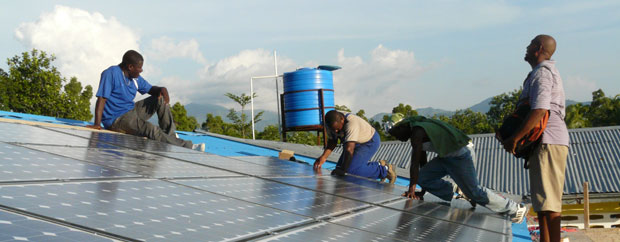
April 2015 - At this year’s Africa Carbon Forum held in Marrakesh from April 13 – 15 there were clear signs that there is room for reformed use of the CDM and linking it with African NAMAs. The issue of how to generate demand must, however, be answered by the EU. As a result, many of the questions put forward by the African representatives focused on using the EU’s Intended Nationally Determined Contribution (INDC) as a basis for the emission reduction targets to be set out in the Paris Agreement. They also called for the EU to issue a binding statement on use of international certificates.
When developing NAMAs on the basis of programmatic CDM projects (PoAs), organisational and institutional problems had been experienced with both mechanisms. By way of contrast, the system for using PoAs in top-down development of NAMAs was seen as easier.
Building on the Lima Call for Climate Action, the three-day conference ended with the adoption of the Marrakesh Call for Climate Action, which was presented by Moroccan Environment Minister Hakima El Haite. The key summary conclusions include:
A key policy vision of the African countries is for CDM projects to be eligible for financing under the Green Climate Fund (GCF).
The initiative of female representatives of the African CDM Designated National Authorities was expressly welcomed. They want to establish a group entitled Women for the CDM, which is designed to promote CDM projects aimed at improving the quality of African women’s lives. This will include projects involving cooking and water treatment, whose implementation should not only contribute to climate change mitigation, but prevent damage to human health and give women more free time to establish self-determined lifestyles (education and social participation).
Cookie Settings
Marketing-Cookies werden von Drittanbietern oder Publishern verwendet, um personalisierte Werbung anzuzeigen. Sie tun dies, indem sie Besucher über Websites hinweg verfolgen.
Provider:
Statistik Cookies
Statistik-Cookies dienen der Analyse und helfen uns dabei zu verstehen, wie Besucher mit unserer Website interagieren, indem Informationen anonymisiert gesammelt werden. Auf Basis dieser Informationen können wir unsere Website für Sie weiter verbessern und optimieren.
Provider:
Erforderliche Cookies
Erforderliche Cookies sind für den reibungslosen Betrieb der Website zuständig, indem sie Kernfunktionalitäten ermöglichen, ohne die unsere Website nicht richtig funktioniert. Diese Cookies können nur über Ihre Browser-Einstellungen deaktiviert werden.
Provider: